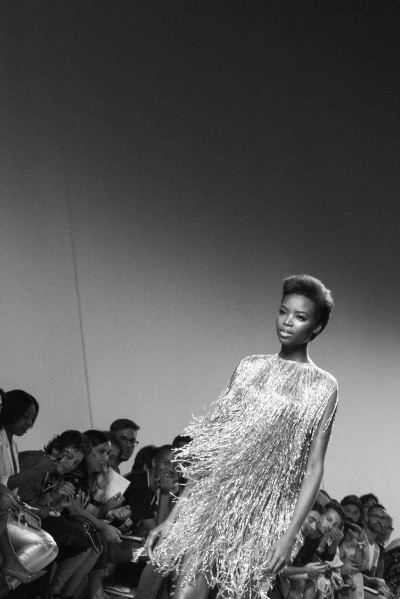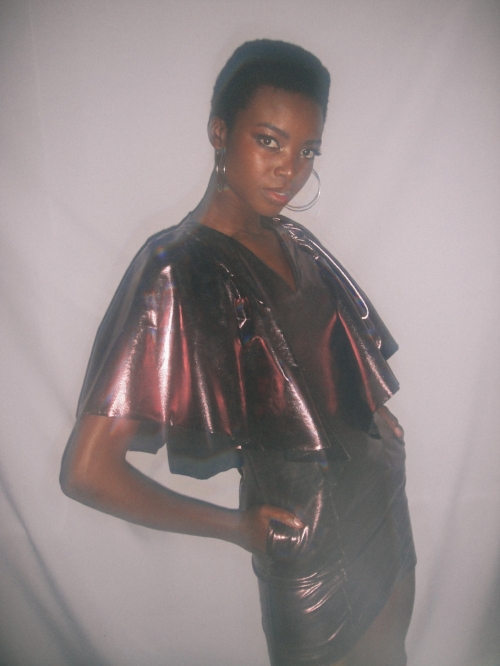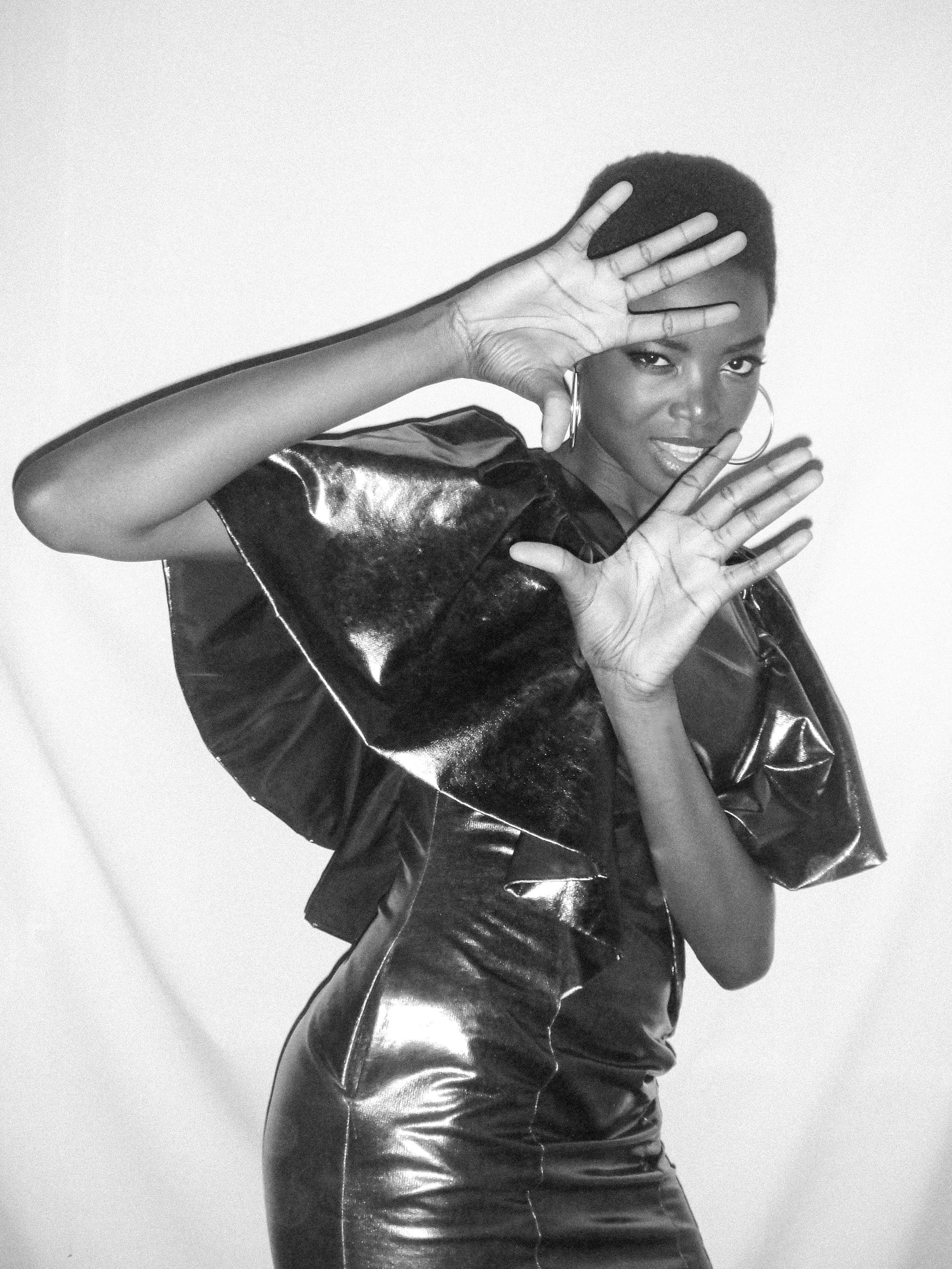by Sofia Craveiro
We had the chance to talk with Eduarda Abbondanza.
That talk was absolutely inspiring. There are no words to describe the power, truth and pureness of the thoughts she transmitted.
Thoughts like: “Changes are happening. We are just too numb to be aware of them” or “It’s not the tools that make things happen. It’s the people”, “It seems like the whole world fell asleep” these quotes are priceless lessons about the way we face life.
We spoke about fashion, designers, politics, democracy, culture and lack of knowledge and the way all those things are connected and influence every aspect of life.
The importance of culture and education to gain freedom of thought was more that clear. In fashion and in life. As Humans we can do better. We should do better.
The following text in an attempt to transmit a bit of the effortless strength we saw in that room…
Portrait by Rui Palma ®
Eduarda Abbondanza:
I’ve always faced fashion as something that requires experience.
I did an internship with Ana Salazar because she was the only fashion structure in Portugal. I wanted to understand her way of working. She organized things by season and handled with international suppliers and buyers. My interest was to learn everything I could with her because I knew I needed to gain business expertise. You can’t decide your creative direction if you don’t understand how the process work. That’s why I did that internship.
With Moda Lisboa the plan was to have a structure to show the work made for my brand – the one I had with Mário Matos Ribeiro.
Moda Lisboa is not a management structure. It’s much more than that! Moda Lisboa has a huge creative potential. And it is, in fact, a design project. It is thought with a concept that involves research, that leads to a moodboard…
My brand eventually was left behind because I never liked the atelier work anyway. It was very violent for me. I wanted to do fashion without having to show myself. And everything I did had to pass by me or Mário. One day at Príncipe Real I passed by a woman wearing a white shirt and jacket designed by me. She could have worn any white shirt she wanted but she wore mine, without knowing who I was. At that moment I realized that’s what fashion is all about: the piece, not me. I loved that. It made me had that “click”: “this is fashion!”. It’s not about me, it’s just about my work.
We were utopic in this way. I was utopic.
Of course this happened in the 90’s. Those were extraordinary years.
I was just watching some documentaries the other day and really thought about what an important time for fashion that was, due to a great freedom for culture and arts. All art needs freedom. Prohibition doesn’t go with creation. “Forbidden” is a word that doesn’t match with art. It doesn’t.
Of course there are segments that need to be protected (like the children for example) but in general, the people need to be free to choose. Choosing to see, to go, to like, to buy, to live…there’s no other way to appreciate things. But it always depends of course. We cannot analyze Instagram, for example, and think that everyone uses it the same way.
At the end of the day people have all kinds of tools in their hands. Those can be used in the right or the wrong way.
For instance, democracy – which for me it’s the only possible political regime – I value democracy a lot but it needs to be taken care of. It only works if you live in a society with culture and education. With the economic crisis, countries started doing cuts exactly in those sectors and that leads to a lack of judgment by the citizens and then democracy doesn’t work properly. And future generations are threatened. People just criticize and react negatively to everything without being up to date. In a democracy people have the right to choose. The important thing is to choose wisely, and a wise choice can only be done if people are informed and most of all capable of being critical with information they receive. It’s important to build a responsible opinion and not just follow the flock. Otherwise democracy is under threat.
I think the digital subject is a lazy one. It seems the whole world fell asleep. We are numb. We don’t know anything anymore, we can’t remember a thing. History and culture are connected with the past, with the ability to remember things. Before, I memorized the telephone numbers of all my friends. Now I don’t even know my daughter’s and maybe without sleep I won’t even recall my own!
Anything you need to know you search online. You don’t have to memorize anything anymore, so we just don’t train our brains.
People have information, that’s a fact but you also need to have culture to access the right information. To know what to look for. If your dimension is small, if you don’t have any culture, you’ll be searching for what makes sense in that small dimension, because you don’t have the capacity to go further. It’s not the tools that make things happen, it’s the people. The human being is the center of everything. The fact that everyone has the same devices doesn’t mean everyone will do the same things with them and react the same way.
We can’t let our brains become numb!
What worries me the most is the possibility of democracy losing its efficiency. Why? Because I was born analogic in a dictatorship and when we gained freedom we were already entering the digital era. To go backwards would be just…no. I’m sorry, no.
Changes are happening. We are just too numb to be aware of them. I realized Trump would win the elections the minute I saw people against Obama. That really affected me.
If you don’t have the ability to analyze and think about what you see and read, you just go with the flow and never really understand things properly. This is the main issue, I think.
People need to have more culture and thought in order to be free to evaluate. That is purely related with democracy/freedom and with the reasons why we created ModaLisboa. In the past, Portuguese fashion designers would have to emigrate to work in fashion. We wanted them to have the same opportunities as other European citizens, but they needed to learn first. So, the first editions really functioned like a masterclass for the ones who wanted and had the skills to work in fashion. We worked to give them freedom.
Now the times have changed. We went through many different phases.
Sometimes we didn’t understand clearly the creative vision of the designers. But I don’t think I have to do everything and always tell people what I think. I just need to build a structure that allows them to learn for themselves. The market will respond.
In Sangue Novo (New Blood), for example, we only choose accordingly with the quality of the candidates we have. There are eight spots but if there are nine good candidates we can turn it around. The same thing happens if we only have five good ones. We are not going to select more people just to make a number. We only work with those who are worth for. Never let external pressures of any kind affect our working base. We work based in talent. And that is utopic, very utopic. We search for merit, no matter where it comes from or whom it’s related with. We had many problems in the past because of our way of working but it’s the way of work we believe in. We look for greatness, only that.
So we work to give freedom to that greatness.”
Thank you Eduarda Abbondanza.

























